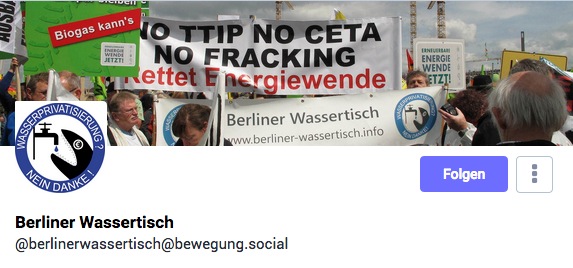Privatsphäre stärkt, Überwachung schwächt! #StopScanningMe


Suche

Schiefergas-Fracking in Deutschland?

#StopEUMercosur Erklärung

Aktion Greenpeace: #StopEUMercosur

#SaveTheOkavangoDelta
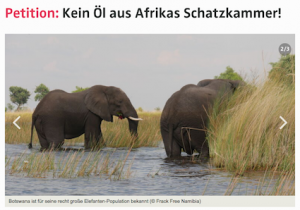
Erfolgreich! Über 1 Million Unterschriften „Green Deal“ – Europäische Bürgerinitiative (EBI)

Stop Energiecharta. #NoECT. Wir wollen raus aus dem Anti-Klimaschutz-Vertrag
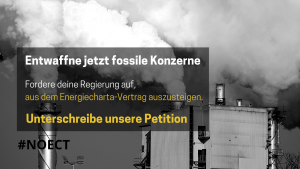
Europäische Bürgerinitiative gegen biometrische Massenüberwachung (17.2.2021-17.2.2022)

Lebensgefährliche Entwicklung: Gewinnorientierung im Krankenhaus
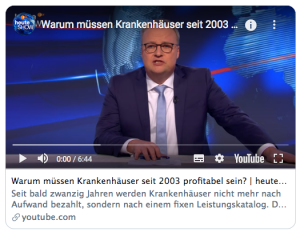
- Wassertisch-Plenum,
im NewYorck / Bethanien Mariannenplatz 2A
10997 Berlin Openstreetmap fällt coronabedingt aus Überblick (Messstellen: Oberflächengewässer und Grundwasser)


-
Letzte Beiträge
- AöW zum Weltwassertag 2023: Interkommunale Zusammenarbeit noch stärker ermöglichen
- Greenpeace: Fracking – eine unterirdisch schlechte Idee
- Bürgerinitiative gegen CO2-Endlager: Offener Brief an den Bundesminister für Wirtschaft und Klimaschutz Dr. Robert Habeck
- BUND gegen CCS-Endlager
- Jürgen Knirsch: CETA-Handelsabkommen: Eine trügerische Wette auf die Zukunft (Leserbrief an die SZ vom 8.12.2022)
- Neuere Materialien und Dokumente zur CETA-Debatte
- TAZ: Hamburger Abgeordneter über Olympia-Gedankenspiele: „Es kommt zu Vertreibungen“
- NDR: Bewirbt sich Hamburg noch einmal um Olympische Spiele?
- NGO-Bündnis fordert mit gemeinsamen Appell die Senkung des absoluten Ressourcenverbrauchs
- Allianz der öffentlichen Wasserwirtschaft warnt vor CETA: Mit dem jetzigen CETA-Text wird der Schutz der öffentlichen Wasserwirtschaft vor einer Kommerzialisierung weiter geschwächt

Delius-Klage
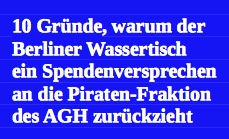
Keine Steuergelder für LNG-Fracking-Gas Terminals in Deutschland!

RSS-Feeds
Schlagwort-Archive: Gewerkschaft
Die Bildungsinternationale (BI) spricht sich gegen TTIP, CETA, TiSA, TPP und Privatisierung aus
Auf ihrem vom 21.–26. Juli in Kanada stattfindenden Weltkongress 2015 hat die Bildungsinternationale (engl. Education International) eine Resolution gegen TTIP, CETA, TISA, TPP and ähnliche Handels- und Investionsschutzabkommen verabschiedet:
Support for EI’s campaigns against privatisation and trade deals (23 July 2015)
Alarming privatisation trend
“We must resolutely stand up against privatisation in education which cripples universality of the right to education, aggravating marginalisation and exclusion in education, creating inequities in society,” said Kishore Singh, United Nations Special Rapporteur on the Right to Education.
He also congratulated the EI Congress for passing its resolution (1.1) on Privatisation and Commercialisation in and of Education. “This is imperative in the face of the explosive growth of privatisation in education, which is making its intrusion at all levels in education. And the phenomenon of education as an attractive business is assuming alarming proportions, with scant control by public authorities.”
Anti-democratic trade deals
EI’s resolution (1.13) to Stop TTIP, TISA, CETA, TPP and Other Similar Trade and Investment Agreements was referenced by David Boys, Deputy General Secretary of Public Service International (PSI). He said PSI has also mobilised its members against these “so-called trade deals”. He continued: “These deals are a direct attack on democracy and will further extend corporatisation over public services.”
Both resolutions were carried at second plenary of Congress on 22 July and mandate the Executive Board to campaign at the highest levels against the trade deals and commercialisation of education.
Zum Beitrag
Außerdem spricht sich die globale Dachorganisation von ca. 400 Bildungsgewerkschaften aus 170 Ländern mit über 30 Millionen Mitglieder gegen die Kommerzialisierung und Privatisierung der Bildung und Erziehung aus:
Congress gears up anti-commercialisation strategy (24 July 2015)
The resolution on privatisation in and of education received unanimous support at Education International’s world congress, giving way to a new policy strategy that aims at coordinating global and national responses.
Education International (EI)’s Congress, a quadrennial decision-making assembly that has brought together thousands of participants and delegates in Ottawa, Canada, has acknowledged the risk that the privatisation and commercialisation in and of education poses to the public enterprise of education. This was reflected during the Congress business in the unanimous adoption of resolution 1.1 that notes “with concern the increased engagement and promotion of private actors in education governance (provision, funding, management and policy-making), coupled with major challenges in terms of educational access, equity and quality, and the lack of political commitment to the provision and financing of public education systems in many low– and middle-income countries.”
Affordable education or profiting from the poor?
In a very well attended break-out session on the subject, four trade union leaders from the United States, the Philippines, Kenya and Brazil discussed case studies from their national experience, unveiling the different faces of privatisation around the world. Their experiences were framed by a keynote speech on low fee private schools from Prachi Srivastava, lecturer at Ottawa University, and enriched through the policy perspective of EI’s Angelo Gavrielatos, Director of the Global Response Project.
Prachi Srivastava, a leading specialist on low-fee private education institutions, has described how these are proliferating in several countries of the global South, setting a new global trend that started over a decade ago. This business has seen a shift from family-owned private schools to the massive entry of transnational corporations into the market, creating an opaque network of investors and stakeholders.
Ms. Srivastava has put into question the concept of ‘affordable’ as advertised by these institutions, and supported by organisations like the World Bank, as the way to increase access to education by the poorest families, in States where the public provision of education lacks means and implementation. Reality shows that sending one single child to schools like Omega or Bridge can demand an economic investment of between 25 percent and 50 percent of a family’s income.
From the global strategy to national action
Wilson Sossion (KNUT, Kenya), Fatima da Silva (CNTE, Brazil), Francisca Castro (ACT, Philippines), and Randi Weingarten (AFT, USA) have explained how their unions are facing the trend of privatisation and education, from pre-school to higher education.
One of the most worrying tendencies is the diversion of public funds towards the financing of private providers, as is the case in Philippines and Brazil. This trend is being fostered by the recommendations of international bodies like the World Bank, as is the case in Kenya.
AFT President Randi Weingarten has explained how, in coordination with NUT (UK), her union managed to put pressure on edu-business giant Pearson, through a shareholder action that was accompanied by a very successful social media campaign.
The session emphasised the need to design strategies that coordinate global and national levels, based on actions of industrial, media and legal nature, in order to achieve the projects’ objectives. From the floor, one key idea emerged: the coordination amongst trade unions and with other civil society and political actors is the only way to create a global response that is becoming increasingly urgent.
Zum Beitrag
Die Bildungsinternationale (BI) in Deutschland: http://www.bildungskampagne.org
Public Services International: Jahresbericht 2013 (englisch)
Public Services International Jahresbericht 2013 (englisch)
Gewerkschaft NGG lehnt Fracking ab: „Die Risiken sind unkalkulierbar“
Gewerkschaft Nahrung Genuss Gaststätten (NGG)
05.06.2014
Fracking. „Die Risiken sind unkalkulierbar“
Von Claus-Harald Güster
Medienberichten zufolge will die Bundesregierung noch in diesem Jahr entscheiden, unter welchen Bedingungen die umstrittene Gasfördertechnik „Fracking“ in Deutschland künftig zum Einsatz kommen darf. Beim Fracking – eine vor allem in den USA weitverbreitete, relativ neue Fördertechnik – wird unter Einsatz von Chemikalien und hohem Druck in großen Tiefen Gestein zerbrochen. So können Gasvorkommen erschlossen werden, die der konventionellen Förderung bisher verschlossen blieben. Kritiker des Frackings kritisieren vor allem die weitestgehend ungeklärten, möglicherweise fatalen Auswirkungen auf die Umwelt, z.B. das Grund- und Trinkwasser.




 Pressemitteilungen
Pressemitteilungen